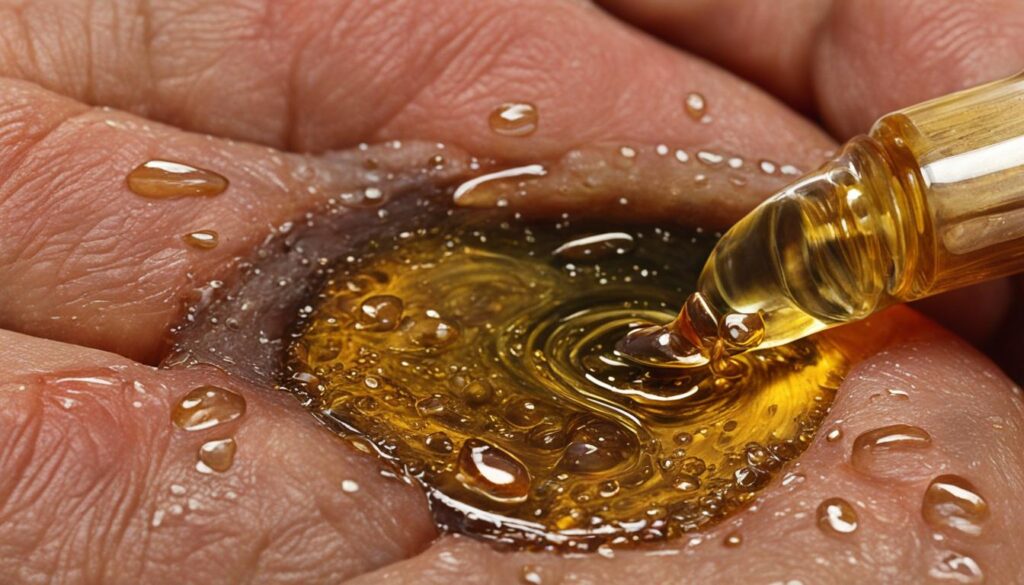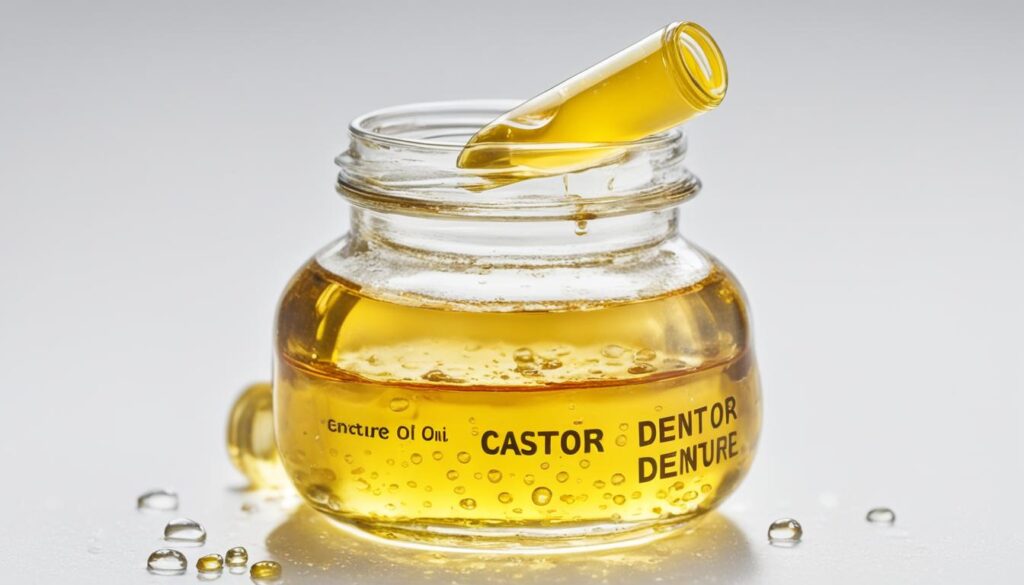Castor oil is a popular natural treatment used for various purposes, including skin care. It is derived from the seeds of the Ricinus communis plant and has been used for centuries for its medicinal properties. It is known to have moisturizing benefits for the skin and contains fatty acids that can hydrate and nourish the skin. In addition, castor oil has anti-inflammatory and antioxidant properties that may help promote healthier skin. However, scientific evidence supporting its role in thickening the skin is limited.
Key Takeaways:
- Castor oil is a natural treatment for various skin conditions.
- It has moisturizing properties and contains fatty acids that can nourish the skin.
- Castor oil has anti-inflammatory and antioxidant properties that may promote healthier skin.
- Scientific evidence supporting its role in thickening the skin is limited.
- Consult with a healthcare professional or dermatologist for personalized advice on using castor oil for skin concerns.
The Benefits of Castor Oil for Skin
Castor oil offers numerous potential benefits for the skin, making it a popular choice in natural skincare routines. Its unique properties make it an effective moisturizer, helping to maintain skin hydration and prevent dryness. The high concentration of fatty acids, particularly ricinoleic acid, in castor oil gives it emollient properties that soften and smooth the skin, leaving it supple and revitalized.
One of the notable benefits of castor oil is its potential to promote wound healing. By creating a moist environment and reducing inflammation, castor oil supports the natural healing process of the skin. It can be applied to minor wounds and cuts to accelerate healing and reduce scarring. However, it’s important to note that while castor oil is believed to aid in wound healing, scientific evidence supporting this claim is limited.
Castor oil also serves a practical purpose in maintaining oral health. It possesses antimicrobial properties that can assist in cleaning and storing dentures. By inhibiting the growth of bacteria and fungi, castor oil helps prevent oral issues such as inflammation and infection. Soaking dentures in a castor oil solution can effectively eliminate harmful microorganisms, promoting better oral hygiene.
Although castor oil offers these potential benefits for the skin, it’s important to proceed with caution. While there is anecdotal evidence supporting its efficacy, scientific research supporting castor oil’s benefits in skincare is limited. Furthermore, it’s vital to note that individual results may vary.
Benefits of Castor Oil for Skin:
- Acts as a natural moisturizer, preserving skin hydration
- Smoothes and softens the skin due to emollient properties
- Promotes wound healing by creating a moist environment and reducing inflammation
- Assists in cleaning and storing dentures to prevent bacterial and fungal growth
To fully understand the potential benefits and risks associated with using castor oil for your specific skin concerns, it’s recommended to consult with a dermatologist or healthcare professional.
The Use of Castor Oil as a Laxative
One of the well-known uses of castor oil is as a stimulant laxative. It is classified as a stimulative laxative, which means it increases the muscular movement in the intestines, aiding in bowel movements and relieving constipation.
Castor oil is approved by the FDA for use as a laxative, but it is recommended for short-term and occasional use only. Long-term use of castor oil as a laxative can have potential side effects such as abdominal cramping, nausea, and diarrhea.
Castor Oil as a Moisturizer for the Skin
When it comes to moisturizing the skin, castor oil is a popular choice in the world of natural skincare. Rich in ricinoleic acid, a monounsaturated fatty acid, castor oil acts as an occlusive moisturizer, helping to lock in moisture and prevent water loss from the skin. This makes it an excellent choice for those looking to keep their skin hydrated and nourished.
Unlike store-bought moisturizers that often contain synthetic ingredients, castor oil offers a natural alternative. However, it’s important to note that using pure castor oil directly on the skin may cause adverse reactions in some individuals. To avoid any potential skin irritation or allergic reactions, it’s recommended to dilute castor oil with another carrier oil, such as almond or coconut oil.
By diluting castor oil, you not only reduce the risk of skin sensitivities but also enhance its moisturizing benefits. The combination of castor oil and a carrier oil creates a potent blend that can deeply hydrate and nourish the skin, leaving it feeling soft and supple. This versatile oil can be applied to various areas of the body, including the face, body, and even the hair and scalp.
When using castor oil as a moisturizer, it’s best to incorporate it into your daily skincare routine. Begin by cleansing your face and then apply a small amount of the diluted castor oil to your skin, gently massaging it in circular motions. Allow the oil to absorb fully before applying any other skincare products or makeup.
It’s important to remember that everyone’s skin is unique, and results may vary. While castor oil can be incredibly beneficial for moisturizing the skin, individuals with specific skin conditions or concerns should consult with a dermatologist before incorporating it into their skincare routine.
With its moisturizing properties and natural origins, castor oil has become a go-to option for those seeking to keep their skin hydrated and healthy. By diluting it with a carrier oil and using it regularly, you can enjoy the nourishing benefits of castor oil and indulge in the goodness of nature for your skincare needs. Remember, healthy skin is happy skin!
Castor Oil for Wound Healing
When it comes to wound healing, castor oil has been a trusted natural remedy for centuries. Its unique properties make it a valuable ingredient in ointments and dressings for various types of wounds, ranging from chronic ulcers to burns and surgical incisions. The key component of castor oil, ricinoleic acid, plays a crucial role in promoting the healing process.
Ricinoleic acid, found abundantly in castor oil, possesses both anti-inflammatory and pain-reducing properties. This naturally occurring fatty acid helps reduce skin inflammation, providing a conducive environment for healing. By creating a moist environment, castor oil can accelerate the healing process by facilitating cell regeneration and minimizing scarring.
Consulting with a healthcare professional or wound care specialist is essential before applying castor oil to any wound. They can offer personalized guidance on the appropriate use and application methods based on the specific wound type and condition. This will ensure optimal results and prevent any potential complications.
| Benefits of Castor Oil for Wound Healing | Precautions for Using Castor Oil on Wounds |
|---|---|
|
|
When using castor oil for wound healing, it is important to remember that individual responses may vary. While castor oil can be beneficial for numerous individuals, it is not a substitute for professional medical advice. Always consult with a healthcare professional to determine the most suitable treatment approach for your specific wound.
Expert Insight: Dr. Samantha Lopez, Wound Care Specialist
“Castor oil has been utilized in wound care to create a favorable environment for optimal healing. Its anti-inflammatory properties and ability to moisturize the wound bed make it an effective natural remedy. It is essential to seek guidance from a healthcare professional to ensure proper usage and mitigate any possible risks or complications.”
By harnessing the healing properties of castor oil, individuals can potentially expedite the wound healing process and promote healthier skin. However, it is crucial to approach wound care holistically and rely on professional medical advice to achieve the best possible outcomes.

Castor Oil for Cleaning and Storing Dentures
When it comes to maintaining proper oral hygiene, caring for dentures is essential. Dentures can harbor harmful bacteria and fungi, leading to oral issues such as inflammation and infection. This is where castor oil can come to the rescue. With its antimicrobial properties, castor oil can effectively clean and store dentures, promoting oral health.
Soaking dentures in a solution containing castor oil can help kill bacteria and prevent the growth of fungi, including the notorious Candida. Castor oil’s antimicrobial properties act as a natural defense against these oral pathogens, reducing the risk of oral infections and promoting a healthier mouth.
As with any oral care practice, it’s important to remember that proper hygiene and regular cleaning are crucial for maintaining denture health. The combination of regular cleaning and the antimicrobial properties of castor oil can help keep dentures clean, fresh, and free from harmful microorganisms.
How to Clean and Store Dentures with Castor Oil
Here’s a step-by-step guide on how to effectively clean and store dentures using castor oil:
- Remove dentures from the mouth and rinse them under running water to remove any loose debris.
- Prepare a solution by mixing 1 tablespoon of castor oil with 1 cup of warm water.
- Place the dentures in the castor oil solution and let them soak for at least 15 minutes. This will allow the castor oil to penetrate and clean the dentures.
- After soaking, brush the dentures gently with a soft toothbrush to remove any remaining debris or stains.
- Rinse the dentures thoroughly under running water to remove any traces of castor oil.
- Store the dentures in a clean, dry container or denture case to protect them from dust and contamination.
- Repeat this cleaning and storing process at least once a day to keep your dentures clean and free from harmful microorganisms.
By incorporating castor oil into your denture cleaning routine, you can ensure that your dentures stay fresh, clean, and free from microbial growth.
| Benefits of Using Castor Oil for Denture Cleaning and Storage |
|---|
| Antimicrobial properties of castor oil can help kill bacteria and fungi on dentures. |
| Regular use of castor oil can prevent the growth of harmful microorganisms, reducing the risk of oral infections. |
| Castor oil is a natural and non-toxic alternative to chemical-based denture cleaners. |
| Proper denture cleaning and storage with castor oil can prolong the lifespan of your dentures. |
Remember, while castor oil is an excellent addition to your denture care routine, it’s important to consult with your dentist or prosthodontist for personalized advice on denture maintenance and oral health.

The Use of Castor Oil for Hair and Scalp Health
When it comes to natural remedies for hair and scalp health, castor oil is often recommended. Many believe that this versatile oil can moisturize the hair shaft, increase flexibility, and decrease breakage. However, it’s important to note that the scientific evidence supporting these claims is limited, and individual results may vary.
Castor oil is known for its thick consistency and high viscosity, which makes it an excellent moisturizer for the hair. It can help lock in moisture, keeping the hair hydrated and preventing dryness. The oil’s properties also make it a popular choice for those with frizzy or damaged hair, as it can smooth the hair cuticles and reduce the appearance of split ends.
Additionally, castor oil is believed to be beneficial for the scalp. It is thought to nourish and condition the scalp, promoting a healthy environment for hair growth. Some individuals claim that castor oil can stimulate hair growth and improve scalp conditions such as dandruff. However, it’s important to remember that scientific evidence to support these claims is limited.
If you’re considering incorporating castor oil into your hair and scalp care routine, it’s always best to consult with a dermatologist or healthcare professional. They can provide personalized advice based on your specific needs and guide you on the best approach to achieve optimal hair and scalp health.

The Safety and Precautions of Using Castor Oil
While castor oil is generally safe for topical use and as a laxative, it is important to use it with caution and follow proper dosage instructions. Ingesting large amounts of castor oil can lead to potential side effects such as abdominal cramping, nausea, vomiting, and diarrhea. Long-term use of castor oil as a laxative can also have negative effects on the digestive system. Additionally, some individuals may experience skin irritation or allergic reactions when applying castor oil topically. It is advisable to perform a patch test before using castor oil on the skin and consult with a healthcare professional if any adverse reactions occur.
Using Castor Oil for Skin Care
Castor oil is a versatile ingredient that can be incorporated into your skincare routine to promote healthy and nourished skin. However, it is important to use it properly to avoid any potential side effects or skin irritations.
Dilution and Application
To use castor oil for skin care, it is recommended to dilute it with a carrier oil, such as coconut oil or almond oil. This helps prevent the oil from being too concentrated and reduces the risk of skin irritation. Mix equal parts of castor oil and your preferred carrier oil to create a blend that suits your needs.
Once diluted, apply a small amount of the mixture to the desired areas of your skin. Gently massage it in using circular motions until it is fully absorbed. It is best to apply castor oil once or twice a day, depending on your skin’s needs. Start with a small amount and observe how your skin reacts before increasing the frequency or quantity.
Potential Skin Reactions
While castor oil can be beneficial for many people, it is important to note that some individuals may experience skin reactions or sensitivities. Before using castor oil on your face or body, perform a patch test by applying a small amount of the diluted oil to a small area of your skin. Wait for 24 hours and observe if any redness, itching, or irritation occurs. If you experience any adverse reactions, discontinue use and consult a dermatologist or healthcare professional.
Potential Side Effects
Although castor oil is generally safe for topical use, applying pure castor oil directly to the skin can cause dryness, inflammation, and irritation. It is essential to dilute it with a carrier oil to avoid these potential side effects and ensure proper skin hydration. Additionally, castor oil is a rich and heavy oil that could potentially clog pores, leading to the development of acne. If you have acne-prone or oily skin, it is advisable to consult with a skincare expert before incorporating castor oil into your routine.
Remember, everyone’s skin is different, and what works for one person may not work for another. If you have specific skin concerns, it is always best to seek personalized advice from a dermatologist or skincare professional.
By using castor oil appropriately and taking into account your skin’s unique needs, you can enjoy the potential benefits it offers for your skincare routine.
Incorporating Castor Oil into Your Beauty Routine
If you’re looking to enhance your beauty routine, castor oil can be a valuable addition. There are various products available that contain castor oil as an ingredient, offering a range of benefits for your skin and hair. By incorporating these products into your daily regimen, you can enjoy the nourishing properties of castor oil.
Products for Your Beauty Routine
When it comes to incorporating castor oil into your beauty routine, the options are plentiful. Here are some popular products that contain castor oil:
| Product | Description |
|---|---|
| Moisturizers | Hydrate and nourish your skin with moisturizers infused with castor oil. These formulas help lock in moisture, leaving your skin feeling soft and supple. |
| Lotions | Give your body the pampering it deserves with lotions containing castor oil. These lotions provide deep hydration, keeping your skin smooth and moisturized. |
| Cleansers | Gently cleanse your skin while harnessing the benefits of castor oil. Cleansers with castor oil help remove impurities without stripping away essential moisture. |
| Eyelash Conditioners and Serums | Enhance the beauty of your lashes with conditioners and serums that contain castor oil. These products can help nourish and strengthen your lashes, promoting their growth and thickness. |
When using products with castor oil as an ingredient, make sure to follow the instructions provided by the manufacturer. This will help you derive the maximum benefits and ensure safe usage.
Did You Know? Castor oil has been used for centuries for its various medicinal and cosmetic properties. Its moisturizing and nourishing effects make it a popular choice in beauty products.
Patch Test and Safety Precautions
Before incorporating any new product into your routine, it’s always a good idea to perform a patch test. Apply a small amount of the product to a discreet area of your skin and observe for any adverse reactions, such as redness or irritation.
While castor oil is generally safe for topical use, it’s important to exercise caution, especially if you have sensitive skin or allergies. If you experience any discomfort or allergic reactions, discontinue use and consult a healthcare professional.
A Word of Caution
While castor oil offers numerous benefits for your skin and hair, it’s important to note that individual results may vary. What works for one person may not work the same way for another. It’s always best to consult with a dermatologist or healthcare professional for personalized advice tailored to your specific needs and concerns.
Conclusion
After exploring the benefits of castor oil for skin, it is clear that while it may offer certain advantages, its effectiveness in thickening the skin remains limited by the current scientific evidence. Nonetheless, castor oil can serve as a natural moisturizer, improving the appearance and hydration of the skin. However, it is essential to exercise caution when using castor oil, following proper dosage instructions, and conducting patch tests before applying it to the skin.
Individual results may vary, and consulting a healthcare professional or dermatologist is always recommended to ensure personalized advice regarding the use of castor oil for specific skin concerns. While castor oil has a long history of use, it is crucial to prioritize safety and consider other available alternatives if needed. Incorporating castor oil into your skincare routine can be a beneficial addition, but it is essential to be mindful of your skin’s reactions and adjust accordingly.
By being informed and taking appropriate precautions, you can make an informed decision about whether castor oil is suitable for your skincare needs. Remember, it is always best to prioritize your skin’s health and consult with professionals to ensure the best possible outcomes for your unique skin.
FAQ
Does castor oil help thicken skin?
Scientific evidence supporting the role of castor oil in thickening the skin is limited.
What are the benefits of castor oil for skin?
Castor oil can act as a natural moisturizer, moisturize and nourish the skin, and promote wound healing. It can also be effective in cleaning and storing dentures and is often used in hair and scalp treatments.
How is castor oil used as a laxative?
Castor oil is classified as a stimulative laxative and helps increase muscular movement in the intestines, aiding in bowel movements and relieving constipation. However, it is recommended for short-term and occasional use only.
Can castor oil be used as a moisturizer for the skin?
Yes, castor oil is known for its moisturizing properties and can be used as a natural alternative to store-bought moisturizers. However, it is important to dilute it with another oil and perform a patch test before using it on the skin.
How is castor oil used for wound healing?
Castor oil is often used in ointments and dressings for chronic and acute wounds. It creates a moist environment, reduces inflammation, and supports the healing process.
How can castor oil be used for cleaning and storing dentures?
Soaking dentures in a solution containing castor oil can help reduce the growth of harmful bacteria and fungi. It is important to maintain proper hygiene practices and regularly clean dentures for overall oral health.
What are the uses of castor oil for hair and scalp health?
Castor oil is believed to moisturize the hair shaft, increase flexibility, and decrease breakage. However, scientific evidence supporting its role in hair growth and scalp conditions is limited.
What are the safety precautions of using castor oil?
It is important to use castor oil with caution and follow proper dosage instructions. Ingesting large amounts can cause abdominal cramping, nausea, vomiting, and diarrhea. Some individuals may also experience skin irritation or allergic reactions when applying it topically.
How to incorporate castor oil into a skincare routine?
It is recommended to dilute castor oil with a carrier oil and apply a small amount to the skin once or twice a day. It is important to start with a small amount and observe how the skin reacts before increasing usage.
What products contain castor oil as an ingredient?
Castor oil can be found in moisturizers, lotions, cleansers, eyelash conditioners, and serums. It is important to follow the instructions and perform a patch test before using these products.
What are the skin benefits of castor oil?
Castor oil can moisturize and improve the appearance of the skin. However, individual results may vary, and it is best to consult with a healthcare professional or dermatologist for personalized advice.
